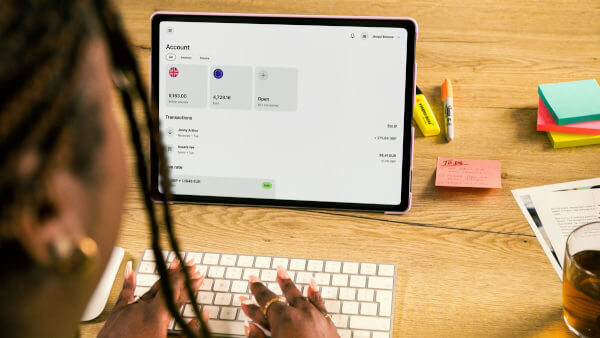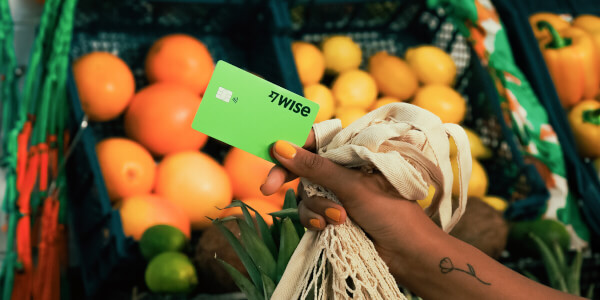Wise ACH vs wire guide
Everything you need to know about using Wise for USD transfers and paying via ACH vs wire

Capital One is one of the ten largest banks in the United States, with more than 700 branches and 39,000 ATM locations nationwide. It’s a credit card specialist, so many travelers use its products when abroad. That means it’s nice to know that Capital One doesn’t charge foreign transaction fees — though that doesn’t necessarily mean you’re home free.
When you’re abroad, you may still end up paying more than you’d expect. Not great, but it comes thanks to the way banks work out what exchange rates to offer you.
In this article, we’ll tell you what you need to know about using a Capital One card overseas. We’ll cover:
Ready to try something new? Take a look at the Wise borderless multi-currency account. With no sign-up and maintenance fees you get access to your own local bank details in the UK, Europe, Australia, New Zealand and the US — so you can get paid and pay like a local. Avoid international transfer fees and keep more of your hard-earned money.
Capital One has a wide range of credit cards, and you can also get a debit card linked to your 360 Online Checking account. Some cards are only available if your credit status is excellent, while others may charge you an annual fee or require an initial deposit. Others may add a fee for transfers for a period after you sign up for the card, or charge a different Annual Percentage Rate (APR) of interest depending on your status. Eligibility criteria vary, so check those for the card you’re interested in carefully.
Also keep in mind, that if you’re looking to withdraw cash, credit cards carry a cash advance fee, which is either $10 or 3% with Capital One credit cards. You can read more about withdrawing cash in the ATM fees section.
| Card name | Annual fee | Other aspects to consider |
|---|---|---|
| Savor Rewards | $0 first year, $95 after first year | Requires excellent credit |
| SavorOne Rewards | None | 3% transfer fee for first 15 months |
| Venture Rewards | $95 after first year | Requires excellent credit |
| VentureOne Rewards | None | APR varies |
| Quicksilver Rewards | None | 3% transfer fee for first 15 months |
| Platinum | None | 26.99% variable APR |
| QuicksilverOne Rewards | $39 | Cash bonus if you spend $500 in first 3 months |
| Journey Student Rewards | None | Increased cashback rate when you pay on time every month |
| Secured Mastercard | None | Initial deposit required for credit line |
| Spark Cash | $0 first year, $95 after first year | Requires excellent credit |
| Spark Miles | $0 first year, $95 after first year | Requires excellent credit |
| Spark Cash Select | None | Requires excellent credit |
| Spark Miles Select | None | 0% APR for first 9 months |
| Spark Classic | None | Average credit level needed |
| 360 Checking Mastercard Debit Card | None |
You might think that you’ll always get the same rate when buying things abroad. That’s not how it is. You can easily only discover this once your bill or statement comes in, but keeping up with a few things can take away this stress.
It’ll help you to know about the mid-market rate. It’s key to getting the best deal. If you search for exchange rates on Google or XE, the figure you’ll see is the mid-market rate. Banks use this value when trading currency with each other. When you use a foreign ATM or buy something while traveling, though, you may pay a less generous rate. That’s because your card issuer can add a markup. They rarely call it a fee, but that’s what the effect is.
You may find it worth looking into another option, the Wise borderless account. This lets you send money to dozens of countries and in dozens of currencies with a single account. Plus, you’ll get to use the mid-market rate. Yes, the same one XE will show you. There’s just one, clear, low fee to pay. We’ll talk more about this in a bit. You can get the Wise multi-currency debit card, that lets you use your money without foreign exchange markup.
If you’re going to take a Capital One card when you go abroad, you’ll want to know about some of the possible fees.
Capital One itself doesn’t charge a fee for getting cash from other networks, but the ATM operator may do.
It’s not all bad news, though. If you’re a customer of certain Capital One products, you may be able to get your ATM fees back, depending on where you go. They will reimburse you charges up to $15 each statement period, and you should find the money back with you within five working days.
You can also check if your destination has any AllPoint ATMs available, where Capital One 360 account owners can get their cash fee-free. We couldn’t find information about Capital One cards being able to access the same network on their website.
Capital One doesn’t charge foreign transaction fees, so this is one charge you won’t need to worry about with an account or card from this bank. You can see some other charges you may face in the sections above, and checking terms and conditions will likely help, too.
It’s usually going to cost you more to use a credit card to withdraw cash, instead of a debit card linked to your checking account. This is because credit cards have a fee called cash advance fee.
There’s information on the bank’s site including those all-important numbers, but Capital One credit cards will charge you either a flat $10 or 3% of the amount of cash you get.
Let’s talk about dynamic currency conversion — or DCC, as it’s usually known. If you’ve ever been asked when getting cash at a foreign ATM, or by a merchant abroad, whether you want to pay in your own currency instead of in the local one, then that’s DCC in action.
DCC sounds great on the face of it, giving you a way to know straight away what the value of the stuff you’re buying is. You’ll be able to work in dollars the whole time and keep track of your spending more easily. That’s an attractive proposition – but what you may not know is that using DCC can hit you in the pocket pretty badly.
The problem is the exchange rate. The merchant or ATM company chooses this, and in many cases they’ll give you a poorer rate.
The takeaway here is simple: choose to pay in local currency to get the best exchange rate.
It’s convenient, quick, and simple to use your card to pay while you’re traveling abroad. The catch is that if you’re not careful, you can end up paying more than you need, thanks to things like DCC. The good news is that there are ways you can avoid a lot of these fees and get a good deal on your transactions. Here are a few hints and tips.
Capital One’s credit and debit cards can be convenient and straightforward while you’re out of the US. There are no foreign transaction fees, either. You’ll get the best deal if you take a little time to compare cards and think about which one suits you best. You may also want to consider alternatives, such as the Wise borderless account which lets you work in over 40 currencies and uses the mid-market rate. You can join the waitlist for their linked debit card right now.
Sources:
All sources last checked on 20th February 2019
*Please see terms of use and product availability for your region or visit Wise fees and pricing for the most up to date pricing and fee information.
This publication is provided for general information purposes and does not constitute legal, tax or other professional advice from Wise Payments Limited or its subsidiaries and its affiliates, and it is not intended as a substitute for obtaining advice from a financial advisor or any other professional.
We make no representations, warranties or guarantees, whether expressed or implied, that the content in the publication is accurate, complete or up to date.

Everything you need to know about using Wise for USD transfers and paying via ACH vs wire

Learn all about how the Wise card compares to no FTF ones.

Can you use a Wise Account to convert money you earn?

See how the Wise card compares with Chase Sapphire in our complete guide

Discover in detail whether your account information is visible to the recipient when you make a payment through Wise.

Not sure if Instarem or Wise is the best option for you in the US? Check our guide and find out.